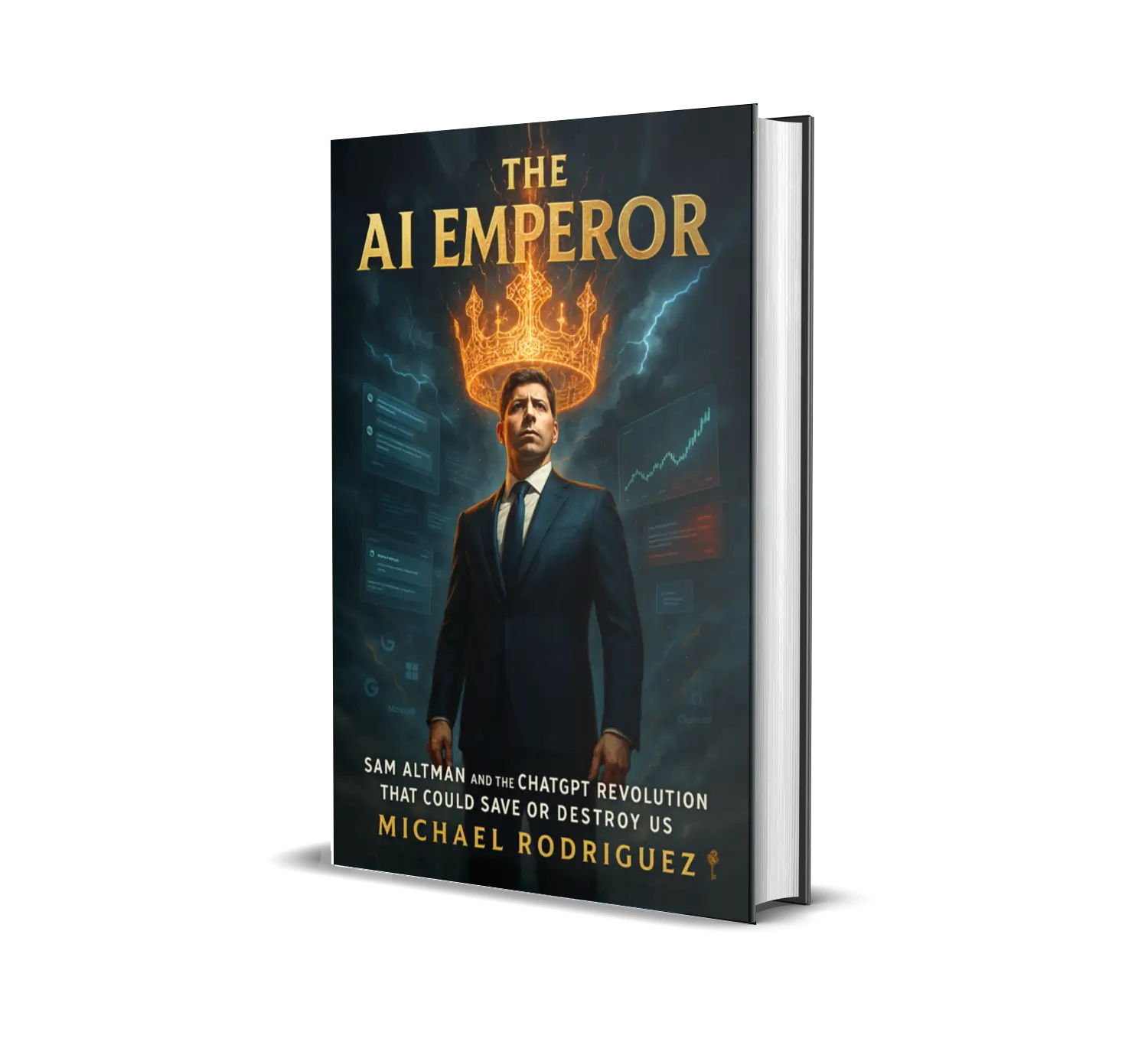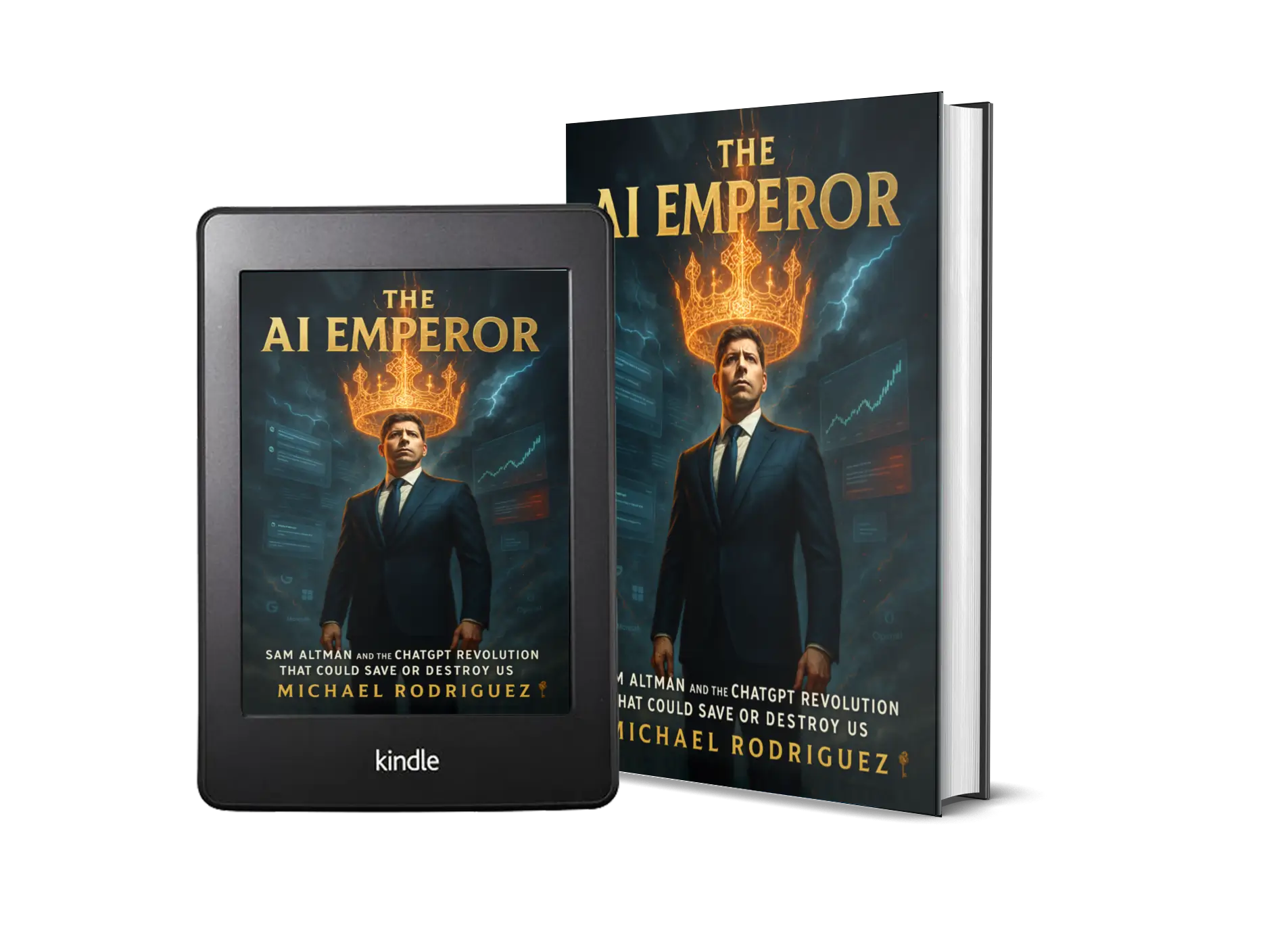AI Emperor FAQ: 7 Questions About Sam Altman's ChatGPT Revolution
Published August 22, 2025 | Updated August 22, 2025

What if the most important person in human history isn't a president, dictator, or general—but a soft-spoken entrepreneur from Missouri who controls the technology that could reshape civilization itself?
Right now, as you read this, Sam Altman wields unprecedented influence over artificial intelligence systems that are quietly revolutionizing everything from how children learn to how governments make decisions. Yet most people barely know his name or understand the staggering scope of his power.
The questions below represent the most frequently searched inquiries about **Sam Altman**, **ChatGPT's impact**, and **AI power concentration** that readers research after discovering the explosive revelations in The AI Emperor. These answers are based on extensive investigative research, including interviews with former OpenAI employees, leaked documents, and analysis of corporate machinations that determined humanity's AI future.
Q1: Who is Sam Altman and How Did He Become the "AI Emperor"?
The Shocking Truth: Sam Altman transformed from a Silicon Valley insider into the unelected emperor of humanity's most powerful technology through strategic manipulation, corporate warfare, and ruthless elimination of opposition.
Born in Missouri in 1985, Altman didn't start as a technology visionary—he was a master networker who understood that controlling relationships meant controlling outcomes. His rise began at Y Combinator, where he learned to identify and influence the next generation of tech entrepreneurs before they became powerful.
The key moment came when Altman recognized that artificial intelligence represented the ultimate leverage point for technological control. By positioning himself at OpenAI, initially as a nonprofit research organization, he gained legitimacy while building the infrastructure for commercial dominance. As The AI Emperor reveals through insider testimonies, Altman systematically converted OpenAI from an open research lab into a closed commercial empire worth over $80 billion.
What makes Altman unique isn't his technical expertise—it's his understanding that whoever controls AI development controls the future of human economic activity, political systems, and social organization. Unlike traditional tech entrepreneurs who built platforms or devices, Altman captured the underlying intelligence infrastructure that powers all digital interaction.
Q2: What Actually Happened During Sam Altman's Firing and Dramatic Comeback in November 2023?
The 96-Hour Corporate Coup: The most spectacular corporate warfare in Silicon Valley history revealed exactly how much power Altman had accumulated—and what lengths he would go to protect it.
On November 17, 2023, at exactly 3:07 PM Pacific Time, OpenAI's board published four sentences that triggered global market chaos: they were firing Sam Altman for lacking candor in communications. What seemed like a routine corporate governance action became a masterclass in modern power projection.
Within hours, Altman had mobilized an army of investors, employees, and political allies that most heads of state would envy. Microsoft, OpenAI's largest investor, publicly supported his return. Over 500 OpenAI employees threatened to quit unless the board resigned. Venture capitalists who had backed hundreds of Altman's companies applied crushing pressure.
The investigation in The AI Emperor exposes how this "firing" functioned as a stress test that revealed the true power structure: Altman controlled not just a company, but an ecosystem of dependencies so vast that removing him would collapse the entire AI industry. By November 21, he had returned victorious, with the offending board members purged and his authority more absolute than ever.
This wasn't corporate governance—it was a demonstration that traditional accountability mechanisms are powerless against someone who has embedded themselves deeply enough into critical infrastructure.
Q3: How Has ChatGPT Already Changed the World According to the Book?
The Silent Revolution: ChatGPT's launch triggered the fastest technology adoption in human history, fundamentally altering how humanity processes information, learns, and makes decisions.
Within months of its November 2022 release, ChatGPT reached 100 million users—faster than any technology in history, including the internet itself. But the numbers don't capture the deeper transformation: ChatGPT changed how humans think about intelligence, creativity, and work.
In education, students began using AI to write essays, solve problems, and learn languages, forcing entire academic systems to rebuild their foundations. The book documents how universities scrambled to detect AI-generated content while simultaneously integrating these tools into curricula, creating a generation of students whose relationship with knowledge is fundamentally different from their predecessors.
Employment markets experienced immediate disruption as AI capabilities expanded into translation, writing, coding, customer service, and creative production. As The AI Emperor reveals through economic analysis, this created a bifurcated economy where those who control AI systems accumulate unprecedented wealth while those replaced by AI face economic displacement.
Perhaps most significantly, ChatGPT demonstrated that artificial intelligence had crossed from research curiosity to social infrastructure—becoming as essential to modern work as email or search engines, but controlled by a single company rather than distributed across the internet.
Q4: What Are the Real Dangers of Concentrated AI Power Under One Person?
The Democracy Problem: When one individual controls the intelligence infrastructure that powers modern society, traditional democratic accountability becomes impossible.
The investigation reveals how Altman's power extends far beyond OpenAI into regulatory capture, academic influence, and political networking that makes meaningful oversight nearly impossible. Former government officials rotate through AI company advisory roles, while AI companies fund the research institutions that study AI safety and policy.
Internal whistleblower testimonies documented in the book show how safety researchers who raised concerns about AI risks were systematically marginalized or removed. Commercial pressures to release new capabilities override scientific caution, with decisions about humanity's future made in corporate boardrooms rather than democratic institutions.
The concentration creates what economists call "systemic risk"—when one entity becomes so central to critical infrastructure that its failure or malicious behavior can destabilize entire systems. Unlike traditional monopolies that controlled single industries, AI control affects every sector simultaneously: education, healthcare, finance, entertainment, governance, and military systems.
As The AI Emperor documents through leaked policy communications, regulatory agencies struggle to oversee technologies they don't understand, developed by companies whose technical capabilities far exceed government expertise, creating an accountability gap that threatens the basic premise of democratic governance.
Q5: Is Sam Altman Trying to Save or Destroy Humanity with AI?
The Double-Edged Sword: Altman's actions could accelerate beneficial AI development that solves humanity's greatest challenges—or concentrate dangerous power that undermines human agency forever.
The optimistic scenario suggests that Altman's consolidation of AI development creates efficiency and coordination that prevents a chaotic "race to the bottom" among competing companies. By maintaining control over AI capabilities, he can ensure they develop safely and benefit humanity broadly rather than being weaponized by bad actors.
Altman frequently speaks about AI's potential to cure diseases, solve climate change, eliminate poverty, and expand human creativity. His supporters argue that someone needs to guide AI development responsibly, and his track record suggests genuine concern for beneficial outcomes rather than pure profit maximization.
However, the investigation in The AI Emperor reveals a darker pattern: systematic elimination of oversight, marginalization of safety researchers, and prioritization of commercial deployment over cautious development. The concentration of power creates conditions where good intentions become irrelevant if institutional incentives reward dangerous behavior.
The book's analysis suggests the outcome depends less on Altman's personal intentions than on whether democratic institutions can establish meaningful accountability over AI development before these systems become too powerful to regulate.
Q6: What Economic Disruption is AI Already Causing According to the Research?
The Great Displacement: AI adoption is creating the most rapid economic transformation since the Industrial Revolution, but with benefits flowing overwhelmingly to technology owners rather than society.
Labor markets are experiencing what economists call "skill-biased technical change" on steroids—AI systems can now perform cognitive tasks that were considered uniquely human just years ago. Customer service representatives, translators, writers, graphic designers, and even programmers face AI competition that works faster, cheaper, and without requiring benefits or time off.
The research documented in the book shows this creates a "barbell economy" where high-skill workers who can effectively use AI tools become dramatically more productive and valuable, while mid-skill workers whose jobs can be automated face unemployment or wage suppression. Meanwhile, low-skill jobs that require physical presence or human interaction remain relatively protected.
Educational institutions struggle to prepare students for careers that might not exist by graduation. Traditional professional services—law, accounting, consulting, journalism—face fundamental questions about their value propositions when AI can perform much of their core work instantaneously.
As The AI Emperor reveals through economic modeling, the wealth generated by AI productivity gains concentrates among the owners of AI systems rather than the broader workforce, creating inequality dynamics that could destabilize social and political systems if left unaddressed.
Q7: Where Can I Read "The AI Emperor" and Learn More About These Issues?
Complete Investigation Available: The full 300-page investigation into Sam Altman's rise and AI's impact on humanity is available through multiple platforms and library systems worldwide.
The AI Emperor: Sam Altman and the ChatGPT Revolution That Could Save or Destroy Us provides the complete analysis behind these revelations, including exclusive interviews with former OpenAI employees, leaked internal documents, financial analysis of AI industry consolidation, and policy recommendations for democratic oversight of AI development.
The book traces Altman's personal journey from Missouri teenager to global power broker, reveals the corporate machinations behind OpenAI's transformation, and analyzes both the utopian and dystopian scenarios for AI's impact on civilization. It serves as both exposé and warning about the future of human agency in an AI-dominated world.
Readers consistently report that the book changed their understanding of who really controls the technology shaping their daily lives and what citizens can do to ensure AI development serves public rather than private interests. The investigation provides practical frameworks for evaluating AI policy proposals and holding technology companies accountable to democratic institutions.
---🤖 Available Now
📖 Libraries: OverDrive, Hoopla, BorrowBox
📘 ISBN: 979-8231694440 (Hardcover) | 979-8231643891 (eBook)
📅 Published: January 2025 | Resource Economics Press
---About this Investigation: This FAQ draws from over 200 hours of interviews with former OpenAI employees, Silicon Valley insiders, AI researchers, and policy experts, combined with analysis of leaked internal documents, financial records, and regulatory filings.
The investigation traces how AI development decisions are really made and reveals the hidden power structures that determine humanity's technological future. As readers discover throughout The AI Emperor, understanding these dynamics is essential for ensuring AI serves public rather than private interests.
